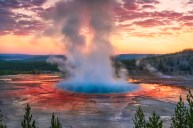Texas has declared a state of emergency for one county after more than 100 earthquakes hit in just a week. What's going on in the west Texas county of Scurry?
That's certainly what officials want to know. Scurry County Judge Dan Hicks wrote a declaration of disaster. The first earthquake registered on July 22 at a magnitude 4.9. He said, "Damage has been found throughout Scurry County in businesses and residences."
The sheer number of earthquakes, both small and large, have locals worried. Hicks told the Abilene Reporter-News that a 5.0 earthquake hit on Friday. It rattled the trophies in their cases at the courthouse. "The building was shaking pretty good," Hicks said. There's been a total of 103 earthquakes. At least 12 have been greater than a 3.0 magnitude.
To make matters stranger, Texas is not even a seismically active part of the country. Justin Rubinstein, a geophysicist with the U.S. Geological Survey, believes it's related to the oil fields. "We can say with confidence that these are related to oil and gas extractions," he said. Drilling companies have been using new technology to search for oil horizontally. When they drill for oil, they also release produced water. This is basically millions of years old salt water. There's a lot of salt water buried in the earth especially compared to oil. "The ratio of oil to saltwater is low. It can be five or 10 or even 20 barrels of saltwater for every barrel of oil," said Rubinstein.
Texas Oil May Be To Blame
SO what are they doing with the produced water? Well these drilling companies can't dispose of it in rivers or the ocean because it's contaminated. Instead, they're pumping it back underground. The expert believes this is causing the earthquakes in Texas. "We've found evidence that saltwater disposal is the most likely cause of the earthquakes in Scurry County. This specific area has seen seismic activity going back to 2020," Rubinstein said.
The Railroad Commission of Texas announced it was looking into whether there was a correlation.
"In efforts to reduce seismicity possibly caused by underground injection of produced water, several operators in the area have converted deep saltwater disposal wells to shallow saltwater disposal wells within the last year," the Commission said in a statement.
"The RRC has shut-in two deep disposal wells in the area following inspections; and staff will continue to monitor wells and seismicity data to mitigate earthquakes and protect the environment and residents in the region," the statement said.




